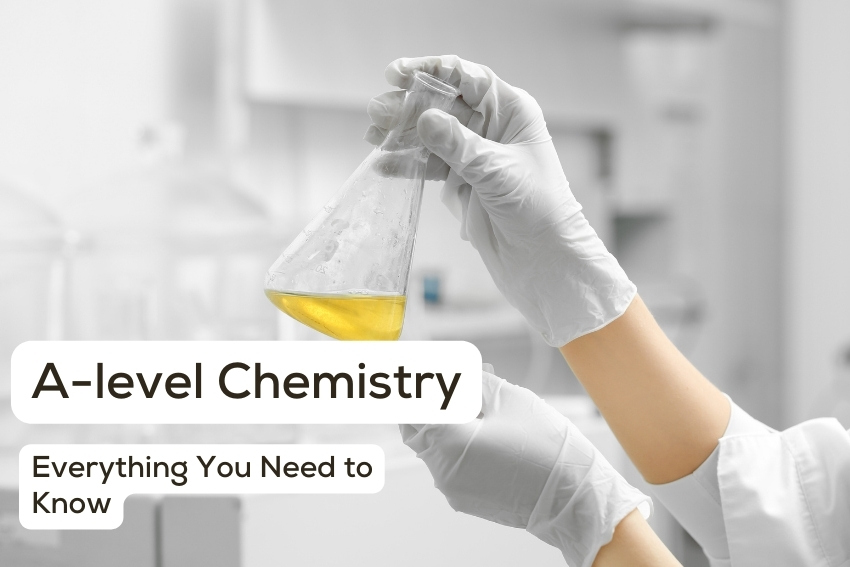A-Level Chemistry is one of the most sought-after subjects for students aiming to pursue careers in science, medicine, engineering, and other technical fields. As part of the advanced qualifications in the UK, A-Levels provide in-depth knowledge, preparing students for higher education and beyond.
Chemistry is often dubbed the ‘central science’ as it connects and overlaps with multiple scientific disciplines. For instance, Chemistry closely overlaps with A-Level Physics, especially in topics like atomic structure, thermodynamics, and electrochemistry, making a strong foundation in both subjects highly valuable.
In this blog, we aim to guide students through every aspect of A Level Chemistry. Whether you’re transitioning from GCSE Chemistry or planning your revision strategy, this comprehensive guide will equip you with all the essential information, tips, and insights needed to succeed.

What Is A Level Chemistry?
A Level Chemistry is an advanced study of the fundamental principles that govern chemical reactions, structures, and properties. Building on the foundations of GCSE Chemistry, this course delves deeper into topics like atomic structure, organic chemistry, thermodynamics, and analytical techniques. It combines theoretical knowledge with practical laboratory skills, providing a holistic understanding of the subject.
The subject is designed to challenge students intellectually while equipping them with transferable skills like problem-solving, data analysis, and logical reasoning. These abilities are highly valued in both academia and the professional world.
How A-level chemistry Links to GCSE Chemistry?
GCSE Chemistry serves as a stepping stone to A Level Chemistry. As you already know, It introduces basic concepts such as:
- Atomic structure and bonding.
- Rates of reaction.
- The periodic table.
- Acids, bases, and salts.
- Organic chemistry basics.
Chemistry builds on these topics, offering a more detailed and complex understanding. For example, students move from learning about simple covalent bonding at GCSE to exploring advanced topics like hybridisation, intermolecular forces, and mechanisms in organic chemistry.
What Is the Aim of A Level Chemistry?
As a student you may be interested what is the aim of this subject and how it will affect your knowledge in chemistry. The primary aim of A Level Chemistry is to develop a deeper understanding of chemical concepts and their real-world applications. This includes:
- Mastery of Core Concepts: You’ll Expand knowledge in key areas such as physical, organic, and inorganic chemistry.
- Practical Skills: You and your peers will develop the ability to plan, conduct, and analyse experiments safely and effectively.
- Problem-Solving: You will learn how to approach complex questions methodically, breaking them down into manageable parts.
- Analytical Thinking: You’ll able to gain skills to interpret data, identify trends, and make informed conclusions.
- Real-World Relevance: You will understand how chemistry impacts industries, environmental issues, and technological advancements.
Chemistry is not just about learning facts – it’s about understanding the “why” behind them. This subject empowers students to think critically and apply their knowledge in innovative ways, preparing them for success in university courses like medicine, biochemistry, and chemical engineering, as well as in careers requiring analytical skills.
In the sections that follow, we’ll dive deeper into the content of A Level Chemistry, exam formats, and strategies for mastering the subject. Let this guide be your companion on the journey to achieving excellence in A Level Chemistry!
A level Chemistry Topics
Chemistry is often considered the ‘central science’ as it connects and overlaps with multiple scientific disciplines. The A-level Chemistry syllabus is designed to offer a broad and deep understanding of the subject. Below are some of the key chemistry topics that make up the A level curriculum.
Organic Chemistry
Organic Chemistry focuses on the structure, properties, and reactions of carbon-based compounds. This section is essential for understanding the chemistry of life and industrial applications. Topics include:
- Introduction to Organic Chemistry: Nomenclature, isomerism, and functional groups.
- Hydrocarbons:
- Alkanes: Free radical substitution and combustion.
- Alkenes: Electrophilic addition and polymerisation.
- Alcohols and Phenols: Reactions, oxidation, and industrial uses.
- Carbonyl Compounds: Aldehydes, ketones, and their reactions, including nucleophilic addition.
- Carboxylic Acids and Derivatives: Esters, amides, and acyl chlorides.
- Aromatic Chemistry: Benzene structure, electrophilic substitution, and derivatives.
- Amines, Amino Acids, and Polymers: Understanding proteins, polymers, and their synthesis.
- Spectroscopy and Analytical Techniques:
- Mass Spectrometry: Determining molecular mass and structure.
- IR Spectroscopy: Identifying functional groups.
- NMR Spectroscopy: Interpreting hydrogen and carbon environments.
Organic chemistry is crucial for understanding biological systems and is highly relevant in pharmaceuticals, petrochemicals, and agriculture.
Inorganic Chemistry
Inorganic Chemistry delves into the behaviour and properties of elements and their compounds, particularly within the periodic table. Topics include:
- The Periodic Table: Trends in ionisation energy, electronegativity, and reactivity across periods and groups.
- Chemistry Group:
- Group 2 (Alkaline Earth Metals): Reactions, uses, and trends in solubility.
- Group 7 (Halogens): Properties, displacement reactions, and halide tests.
- Transition Metals: Characteristics, complex ion formation, and catalytic properties.
- Reactions of Ions in Aqueous Solution: Studying precipitation reactions, ligand exchange, and colour changes.
Physical Chemistry
Physical Chemistry focuses on the fundamental principles governing chemical reactions, energy changes, and the behaviour of matter. Key topics include:
- Atomic Structure: Understanding subatomic particles, electronic configurations, and ionisation energy.
- Bonding and Structure: Exploring ionic, covalent, and metallic bonding, along with molecular shapes and intermolecular forces.
- Thermodynamics: Learning about enthalpy changes, entropy, and Gibbs free energy.
- Kinetics: Studying the factors affecting reaction rates and the mechanisms of reactions.
- Chemical Equilibria: Analysing dynamic equilibrium, Le Chatelier’s Principle, and equilibrium constants.
- Acids and Bases: Calculating pH, understanding the role of buffers, and exploring acid-base equilibria.
- Electrochemistry: Investigating redox reactions, electrode potentials, and applications like fuel cells.
These principles are fundamental to all areas of chemistry and are also applicable in physics and engineering.
Practical Skills in Chemistry
A-Level Chemistry places significant emphasis on practical skills through required practicals and hands-on experiments. Students are expected to:
- Plan and Conduct Experiments: Safely handle chemicals and equipment while investigating chemical principles.
- Analyse Data: Record results accurately, calculate uncertainties, and interpret findings.
- Apply Theoretical Knowledge: Use concepts from physical, organic, and inorganic chemistry to explain experimental outcomes.
Practical work is assessed both during the course and in the final exams, ensuring students develop competency in laboratory techniques and an understanding of real-world applications. These skills are not just exam requirements but are essential for anyone considering a scientific career.
Real-World Applications for A-level Chemistry
Throughout the course, A Level Chemistry connects theoretical knowledge to real-life applications, such as:
- The development of new medicines and materials.
- Environmental issues like climate change and green chemistry.
- Energy production, including fuel cells and renewable resources.
- Industrial processes, such as the Haber process and catalytic converters
Understanding these essential Chemistry topics offers not only academic enrichment but also a glimpse into the relevance and impact of chemistry in everyday life and various professional fields.
One of the most fundamental areas in Chemistry is understanding the Periodic Table. It forms the backbone of various chemical concepts, including periodic trends, electron configurations, and chemical bonding.
Common Challenges in A level Chemistry
Navigating the intricacies of A level Chemistry can be a difficult task. While the subject is undeniably fascinating, it comes with its own set of challenges that may pose difficulties for those who are studying it. Understanding these challenges can provide valuable insights into how to better prepare for the subject.
Complexity of Topics
Chemistry is a multifaceted discipline that delves into the microscopic details of matter and its interactions. Topics like organic synthesis or electrochemistry can be particularly challenging due to their complexity and the level of understanding they require.
Mathematical Skills
Chemistry is not just about understanding concepts; it also involves applying mathematical principles. Topics such as thermodynamics and kinetics require a strong mathematical foundation, often causing difficulties for those who may not be as confident in maths.
Balancing Theory and Practical Work
A-level Chemistry includes both theoretical and practical components. The challenge often lies in balancing the two. While understanding the theoretical principles is crucial, mastering the laboratory techniques is equally important. This duality can sometimes be overwhelming.
Time Management
The breadth and depth of the A-level Chemistry syllabus require a significant time commitment. Proper time management becomes a challenge, especially when juggling other A-level subjects and extracurricular activities.
Conceptual Understanding vs. Rote Learning
Chemistry requires both conceptual understanding and memorisation. Students often struggle with striking a balance between understanding the fundamental principles and memorising the myriad facts, formulas, and reactions necessary for exams.
Exam Technique
Finally, the way questions are phrased in exams can be a hurdle. Understanding what is being asked and how to structure answers appropriately is an essential skill that can often be overlooked.
Being aware of these common challenges provides not just a clearer understanding of what to expect but also offers an opportunity to devise strategies for effective study and exam preparation.
How to pass a Level Chemistry Exams?
The A
Level Chemistry exam is designed to assess both theoretical knowledge and practical skills. It is offered by major exam boards in the UK, including AQA, OCR, Edexcel (Pearson), and WJEC/Eduqas, each with slight variations in format and structure.
Exam Boards and Specifications
AQA – Focuses on Physical, Organic, and Inorganic Chemistry, with an emphasis on practical skills integrated throughout. Assessment: Three written papers covering theoretical concepts and practical skills.
OCR (A) – Is known for its emphasis on problem-solving and real-world applications. Assessment: Three papers, including a synoptic component that tests knowledge across the subject.
Edexcel (Pearson) – Combines core chemistry principles with practical knowledge and application. Assessment: Three exams, each testing a specific area of chemistry.
WJEC/Eduqas – Offers a balance between theoretical and practical assessments, with a strong focus on experimental work. Assessment: Three written papers and a practical endorsement.
Exam Format For A-Level Chemistry
The A-Level Chemistry exam typically consists of three written papers, alongside a separate Practical Endorsement that assesses laboratory skills.
Paper 1 focuses on Physical Chemistry and Inorganic Chemistry topics.
- Includes questions on atomic structure, bonding, thermodynamics, and periodicity.
- Questions include multiple-choice, structured, and extended-response formats.
- Duration: 2 hours.
- Weighting: Approximately 35% of the total grade.
Paper 2: Covers Organic Chemistry and Physical Chemistry topics.
- Topics include mechanisms, spectroscopy, and kinetics.
- Includes practical-based questions that require students to apply theoretical knowledge to experimental scenarios.
- Duration: 2 hours.
- Weighting: Approximately 35% of the total grade.
As for, Paper 3: Synoptic paper assessing all areas of chemistry (Physical, Inorganic, and Organic).
- Includes experimental data analysis and application of knowledge across the subject content.
- Duration: 2 hours.
- Weighting: Approximately 30% of the total grade.
Practical Endorsement For A-level Chemistry
Practical exam is assessed internally by teachers and externally moderated by exam boards. It involves a series of required practicals, focusing on skills like titration, qualitative analysis, and synthesis. practical endorsement is reported as a separate “Pass” or “Fail” grade, it does not contribute to the final A-Level grade but is required for many university courses.
A Close Look at Sample A-level Chemistry Exam Questions
Exam questions in A-level Chemistry can often be the stumbling block where theory meets practice. Understanding how to approach these questions and the common mistakes to avoid can be invaluable. Below are some sample questions along with in-depth explanations that shed light on typical errors and how to navigate them.
Question 1: Calculating Moles from Mass
Sample Question:
Calculate the number of moles of sodium chloride in 58.5g. (Molar mass of NaCl = 58.5 g/mol)
Common Mistake:
Some students might directly use the mass of the substance without considering its molar mass.
Correct Approach:
To find the number of moles, the formula is:
Number of moles=Mass/Molar mass
By applying this formula, you’ll avoid the mistake of not taking the molar mass into account.
Question 2: Acid-Base Titration
Sample Question:
Why is phenolphthalein a suitable indicator for a titration between hydrochloric acid and sodium hydroxide?
Common Mistake:
Students often give vague answers like, “It changes colour.”
Correct Approach:
The ideal answer should explain that phenolphthalein changes colour within the pH range where the equivalence point is expected to occur for the reaction between hydrochloric acid and sodium hydroxide.
Question 3: Organic Synthesis
Sample Question:
Outline the steps to synthesise ethyl ethanoate from ethanol and ethanoic acid.
Common Mistake:
Some students miss out on mentioning the catalyst or the conditions required for the reaction.
Correct Approach:
The answer should include the reactants, the catalyst (usually concentrated sulfuric acid), and the reaction conditions, such as refluxing the mixture.
Question 4: Periodicity
Sample Question:
Explain why the atomic radius decreases across a period.
Common Mistake:
Students may mistakenly attribute this to an increase in the number of shells.
Correct Approach:
The correct answer should mention that the atomic radius decreases due to increased nuclear charge pulling electrons closer to the nucleus, without the addition of new electron shells.
By dissecting these sample questions and understanding the common mistakes that can be made, one gains an edge in tackling the complexities of A-level Chemistry exam questions.
The A-level Chemistry Marking Scheme and Its Objectives
Understanding the marking scheme of A-level Chemistry is pivotal for effective exam preparation. Not only does it provide a roadmap for how marks are distributed, but it also reveals the objectives that examiners have in mind when assessing performance.
Distribution of Marks
For Written Exams each paper is marked out of a specific total (varies by exam board) and weighted towards the overall grade. Marks are allocated for:
- Knowledge and understanding of concepts.
- Application of theories to practical scenarios.
- Data interpretation and problem-solving.
As for, Practical-Based Questions they are embedded in the written papers, these test understanding of experiments, calculations, and data analysis.
Grade Boundaries: Grade thresholds (A*, A, B, etc.) are determined annually by exam boards based on overall performance.
Each component has its own weightage, which varies depending on the examination board. For example, multiple-choice questions might constitute 20% of the total marks, whereas extended responses could make up 30%.
Assessment of Practical Skills

Practical skills are an integral part of the A-level Chemistry curriculum. These skills are assessed both through written exams and separate practical endorsements. The aim is to ensure that students are competent in key laboratory techniques and can apply theoretical knowledge in a practical setting.
Levels of Response
For extended response questions, examiners often use ‘Levels of Response’ marking. In this approach, marks are awarded not just for the content but also for the quality of written communication. This includes clarity, logical flow, and the effective use of technical terms.
Importance of Past Papers
One of the most effective ways to familiarise oneself with the marking scheme is through the use of chemistry past papers. These provide invaluable insights into the types of questions asked, how marks are allocated, and what examiners are looking for in high-quality answers.
By gaining a comprehensive understanding of the A-level Chemistry marking scheme and its objectives, one is better equipped to align their study strategies and exam techniques to meet these criteria effectively.
How To Revise For A-level Chemistry?
Preparing for A-level Chemistry requires a variety of resources to build a robust understanding of the subject. From textbooks to online platforms, each resource offers unique benefits that can aid in effective revision. Below is a list of recommended resources that cater to different learning styles and needs.
Past Papers For A Level chemistry Revision
Utilising past papers is a highly effective strategy for A-Level Chemistry revision. They provide insight into exam formats, question styles, and the depth of knowledge required. Regular practice with these papers enhances exam technique, time management, and confidence.
AQA A Level Chemistry Past Papers
Edexel A-Level Chemistry Past Papers
OCR A-Level Chemistry Past Papers
WJEC Past Papers For A Level Chemistry
Textbooks
- A-Level Chemistry for OCR A: Comprehensive and tailored to the OCR syllabus.
- Edexcel A level Chemistry Student Book: Specifically designed for the Edexcel exam board.
- Chemistry in Context: A general textbook that places chemistry in real-world scenarios.
Textbooks offer structured learning and often include sample questions, explanations, and summaries that are aligned with the exam board’s syllabus.
Online Platforms
- Chemguide: Offers free explanations of various chemistry topics.
- Khan Academy: Provides video lectures and exercises.
- Physics & Maths Tutor: Includes past papers, revision notes, and quizzes.
Online platforms offer the flexibility of studying at one’s own pace and often provide interactive ways to grasp complex topics.
Apps
- The PocketLab: A virtual lab experience.
- Brainscape’s A-Level Chemistry Flashcards: For quick revision and memorisation.
- ChemCollective Virtual Labs: Allows students to perform virtual chemistry experiments.
Apps offer portable and interactive learning experiences, making it easier to study on the go.
YouTube Channels
- Tyler DeWitt: Breaks down complex topics into easily understandable explanations.
- MaChemGuy: Focuses on A-level specific topics and provides exam tips.
YouTube channels offer visual and auditory learners an alternative method to grasp difficult concepts.
Study Groups and Forums
- Reddit’s r/6thForm: A place to discuss A-level topics and seek advice.
- The Student Room: Offers forums where you can ask questions and share resources.
Study groups and forums allow for collaborative learning and offer a platform to seek help on challenging topics.
Utilising a combination of these resources can offer a well-rounded approach to A-level Chemistry revision, catering to various learning needs and preferences.
Conclusion
A-Level Chemistry is a challenging yet rewarding subject that lays the groundwork for numerous academic and professional opportunities. From mastering complex concepts in physical, organic, and inorganic chemistry to developing critical practical skills, this course equips students with the knowledge and confidence to excel in higher education and beyond.
Effective preparation is key to success. Using resources like past papers, targeted revision strategies, and practical experiments can make a significant difference. However, navigating the depth of A-Level Chemistry can sometimes feel overwhelming, and that’s where online tutors come in.
Online A-level chemistry tutors provide personalised support tailored to your specific needs. Whether it’s clarifying difficult topics, perfecting exam techniques, or providing feedback on practical skills, expert guidance can save time and improve results. With the flexibility of online tutoring, you can get the help you need, when you need it, ensuring no question is left unanswered.
With consistent effort, strategic revision, and the right support, including help from experienced online tutors, you can confidently tackle A-Level Chemistry and achieve the results you deserve. The skills and knowledge you gain will not only help you in exams but also set the stage for future success in science, engineering, and beyond. Good Luck!










